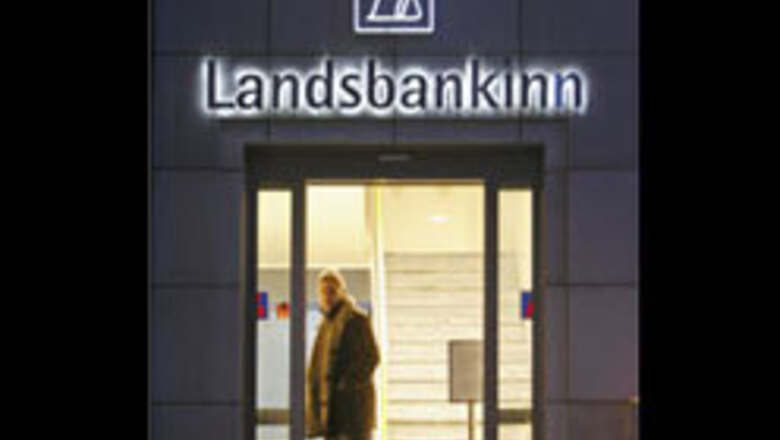
views
Reykjavik: Iceland plunged further into financial turmoil — and muddled into a diplomatic spat with Britain over its handling of the crisis — on Wednesday as the country's third-largest bank went into receivership and the government abandoned attempts to put a floor under its free-falling currency.
As increasingly worried Icelanders attended a protest concert in the capital's main square and reported problems withdrawing and transferring money from banks, their government was scrambling to get a hold on the spiraling situation.
The country’s prime minister Geir H Haarde acknowledged that it will take the tiny Nordic nation of just 3,20,000 people several years to recover from the crisis, which has been wrought by the exposure of the country's top-heavy banking sector to the global credit squeeze.
"What we have learnt from this whole exercise is that it is not wise for a small country to try to take a leading role in international banking," Haarde told reporters. "We are too small to sustain a banking system that has become too big."
A stock market boom in the mid-1990s supported the rapid growth of the country's banking sector, which now dwarfs the rest of the economy with assets at nine times annual gross domestic product of $19 billion.
In urgent moves to downsize that overgrown sector, Iceland on Wednesday said it had put Glitnir into receivership under the Icelandic Supervisory Authority.
The regulator immediately began to restructure the bank, saying it would sell its Finnish and Swedish businesses.
That decision was a sign that problems at Glitnir were larger than the government thought when it announced less than two weeks ago that it would nationalize the bank — the switch into receivership gives Glitnir temporary protection from its debt obligations.
But a similar move with the country's second-largest bank, Landsbanki, which went into receivership on Tuesday, started a diplomatic incident over the standing of accounts held by Swedish and British customers of the bank's Online arm, IceSave.
After British Prime Minister Gordon Brown said he would pursue legal action to recover the lost deposits of some 300,000 Britons who hold accounts with IceSave, Haarde said that discussions had begun between the two countries to find a "mutually satisfactory solution."
"The government of Iceland is determined not to let the current financial crisis overshadow the long standing friendship between Iceland and the United Kingdom," Haarde said as he attempted to salve the situation.
Haarde said that Iceland was also in talks with representatives from the International Monetary Fund who were visiting Reykjavik on a previously scheduled trip, but had not decided whether to formally seek funding from the international body.
He added that talks with Russia over the potential of a 4 million-euro ($5.47 million) loan were scheduled to take place in Moscow next Tuesday.
Until then, some support came from Sweden, where the central bank said Wednesday it would grant liquidity assistance to the Swedish arm of Kaupthing, the country's largest bank, with a loan of up to 5 billion crowns ($702 million).
Meanwhile, the Icelandic central bank, Sedlabanki, said it was giving up attempts to peg its currency to stop the krona free-falling.
The bank had temporarily fixed the exchange rate of the krona at a level equal to 131 krona against the euro — on Tuesday morning — but a plea to the market to support its attempts to strengthen the currency went unheeded and it abandoned the fix Wednesday.
Speculation is also building that Sedlabanki will cut interest rates from the current record high of 15.5 percent after the coordinated cuts by the U.S. Federal Reserve, the European Central Bank and a host of European and Asian countries on Wednesday. Haarde declined to comment Wednesday on whether an Icelandic rate cut was imminent.
The speed of Iceland's downfall has caught many by surprise, despite warnings the country was the "canary in the coal mine" of the global credit squeeze.
The intervention of the British and Swedish authorities underscores the effect that a full-blown collapse of Iceland's financial system would have on the rest of Europe, where Icelandic banks and companies have invested heavily in businesses from the famous toy store Hamley's to English football club West Ham.
Kaupthing alone has racked up debts of more than $5.25 billion in five years to help fund British deals.
Back in Reykjavik, Haarde attempted to reassure average Icelanders that they would not pay the price for the lending practices of the country's leading banks.
Following reports that many locals could not access banking accounts, Haarde said that regulators were working to untangle what he termed "technical problems," and that they expected the banking system to be fully operational by Thursday.
"We must stick together through this crisis, help each other with the kind of optimistic and daring which are the characteristics of the people who live here," he said, noting the country still has strong fundamentals in its fishing, tourism and renewable resource industries.




















Comments
0 comment